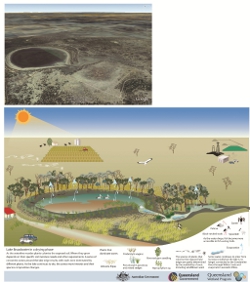|
|
Conceptual model case study seriesArea-specific conceptual model case studies are vibrant, easy-to-understand and illustrated guides to selected wetlands in Queensland. They offer site-specific information and science in the form of conceptual models and text and cover a wide variety of wetland issues to inform and support management. The technique used for developing the conceptual models can be implemented by local wetland managers anywhere in Queensland. Download a case study by clicking on an area on the map or a on name of a case study on the right. Downloads can be up to 50 MB in size. Conceptual model case studies Conceptual model case studies are vibrant, easy to understand, illustrated guides to selected individual wetlands in Queensland. They offer site-specific, synthesised science in the form of conceptual models and text to support and inform management. They cover a wide variety of wetland issues and types. The technique used for developing the conceptual models can be implemented by local wetland managers anywhere in Queensland. Conceptual model case studies are vibrant, easy to understand, illustrated guides to selected individual wetlands in Queensland. They offer site-specific, synthesised science in the form of conceptual models and text to support and inform management. They cover a wide variety of wetland issues and types. The technique used for developing the conceptual models can be implemented by local wetland managers anywhere in Queensland.
Additional informationModelling water-related ecological responses to coal seam gas extraction and coal mining Last updated: 22 March 2013 This page should be cited as: Department of Environment, Science and Innovation, Queensland (2013) Conceptual model case study series, WetlandInfo website, accessed 8 May 2025. Available at: https://wetlandinfo.des.qld.gov.au/wetlands/resources/tools/conceptual-model.html |

 — Department of the Environment, Tourism, Science and Innovation
— Department of the Environment, Tourism, Science and Innovation

